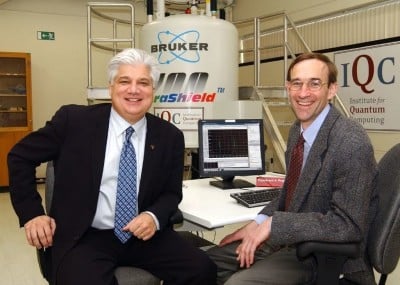Newswise — At a gala celebrating Perimeter Institute’s 25th anniversary, the institute’s leaders and supporters gathered to toast Perimeter’s achievements, recognize the people who made them possible, and consider the future of physics.
Perimeter was founded in 1999, when tech visionary and co-inventor of the BlackBerry, Mike Lazaridis, gave $100 million – one third of his net worth at that time – to establish an institute dedicated to speeding up breakthroughs in theoretical physics. Perimeter Institute officially launched a year later.
“At the time, success was far from certain. Waterloo was not on the map of theoretical physics. But I believed that if we built a place of freedom, collaboration, and excellence, the best minds would come. And then they did,” Lazaridis recalled, speaking to those gathered at the celebration.
With the support of both Federal and Provincial governments, as well as philanthropic partners, Perimeter steadily grew into one of the leading research institutes anywhere in the world. Lazaridis envisioned Perimeter as one node in a thriving research and technology landscape in Waterloo.
“As we built Perimeter, I realized we also needed a way to move discoveries toward applications for Canadian industry. That vision became part of what we called Quantum Valley.” Lazaridis said.
To advance this vision, Lazaridis worked with the University of Waterloo to launch the Institute for Quantum Computing in 2002, where state-of-the-art quantum computing, simulators, sensors, and nanotechnology research could be carried out. In 2016, the Quantum Valley expanded again with the creation of the Quantum Valley Ideas Lab, launched jointly by Lazaridis and Research In Motion co-founder Doug Fregin, to accelerate the commercialization of quantum technologies.
“Today, the Quantum Valley stands as a world-leading ecosystem, turning bold quantum discoveries into breakthroughs that will shape our future,” Lazaridis said.
Perimeter is a core piece of that ecosystem: a hub of expertise pursuing leading-edge research in areas like quantum matter, cosmology, string theory, and quantum gravity.
One of the early recruits to Perimeter Institute was Ray Laflamme, a quantum computing pioneer. Laflamme is perhaps best known for the KLM (Knill-Laflamme-Milburn) Theorem, an insight which underpins the entire field of photonic quantum computing today. A founding faculty member at Perimeter Institute, Laflamme went on to become the first director of the Institute for Quantum Computing at the University of Waterloo. He passed away in June 2025.
Lazaridis and Fregin used the occasion to announce a new research chair in Laflamme’s name.
“Ray was brilliant, but also generous, warm, and endlessly encouraging. His fingerprints are everywhere, in the Institute for Quantum Computing, in Perimeter, and in the lives of those he mentored.” said Lazaridis. “That is why Doug and I are honoured to announce the creation of the Ray Laflamme Early Career Chair in Quantum Computing and Quantum Information at Perimeter. This is more than a gift, it is a way of keeping Ray’s spirit alive in the work he loved most, inspiring future generations with his curiosity, courage, and vision.
The Laflamme Chair will enable the recruitment of a leading researcher in the field, establishing a new research program to advance quantum science and technology.
As Perimeter Institute looks ahead to the next twenty-five years, it does so with renewed convictions about the significance of its mission, as innovations in quantum technologies and artificial intelligence are changing the technology landscape, and as physicists are coming to terms with new insights about the universe from collaborations like LIGO, DESI, and the James Webb Space Telescope.
“Perimeter Institute has exceeded all expectations,” Lazaridis said. “It has strengthened Canada’s reputation globally and become a source of great pride for Canadians. It has pioneered not just what is possible with a focused independent research institute but has also helped drive discoveries and global collaborations. I expect Perimeter’s international reputation will keep it engaged at the highest levels, making breakthroughs as our understanding of the universe is challenged by new results,” said Lazaridis.
Lazaridis was joined on stage by Perimeter Institute’s Director, Marcela Carena, and Chair of the Board, Mike Serbinis, who together thanked all of Perimeter Institute’s supporters and laid out a vision for the next 25 years.
To keep up to date with Perimeter Institute, visit Perimeter Institute’s website or join the mailing list here.
